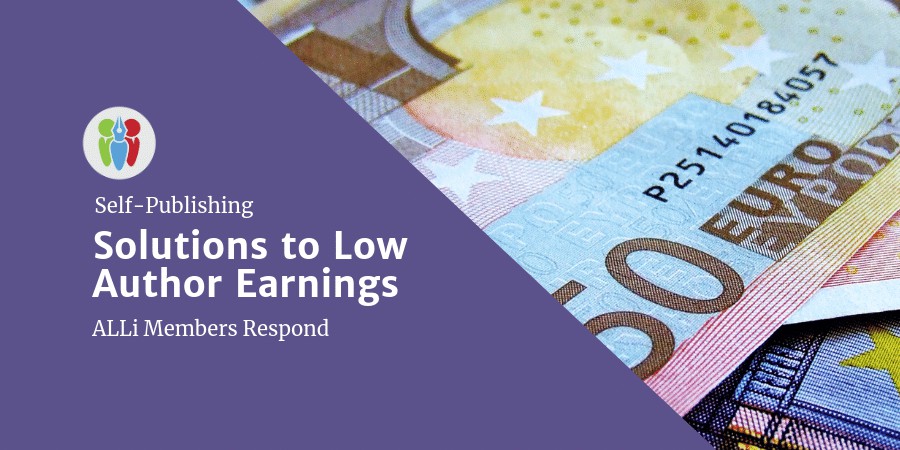Another month, another report about poverty-level author earnings, this time from the UK parliament's All Party Writers Group (APWG). ALLi Director Orna Ross made a deposition to the parliamentary group's hearings, and ALLi is cited as a source in the report, but none of our organization's self-publishing solutions to low author earnings were included. There is no analysis of the impact of self-publishing on author earnings in the report. Boni Wagner-Stafford, ALLi's communications manager, shares some responses and ideas from ALLi's private member forum [with permission], including thoughts from ALLi advisor Jane Friedman who has previously questioned the rationale behind the framing of such reports.

Boni Wagner-Stafford, ALLi Communications Manager
Authors, advisors and the team at the Alliance of Independent Authors are puzzled by the UK parliament's All Party Writers Group (APWG) Report on their enquiry into author earnings. To quote from the June 11, 2019 news release ALLi issued in response:
“There’s a revolution underway in the publishing industry. Independent authors are writing, publishing, licensing rights, and earning significant incomes. But the All-Party Writers Group’s (APWG) … remains stuck in the age-old earnings battle between trade publishers and their content providers.”
Of course, it is appalling that reported author income is so low for so many authors. And it is a good thing that groups, organizations, and author-representative bodies like the UK's APWG are grappling with the issue. There are elements in the report that make sense, such as the call for a reduction in the UK's VAT (value-added tax) on ebooks, which is particularly hard on authors who rely on ebook sales in the UK market.
But looking for solutions for low author earnings by asking governments to step in to “fix” this problem feels like intellectual energy misplaced.
Is it government's role to provide a solution for low author earnings?
Yes, it's hard for most authors, especially beginning authors, to earn a good income. This is true for both traditionally-published and self-published authors. But from an independent author's perspective, blaming publishing contracts or royalty rates, or asking governments to mandate a threshold on author advances, or any other piecemeal attempt to influence what an author earns when they provide content to a publisher, misses more than one point about how the majority of authors actually publish and earn income today.
The Publishing Landscape Has Changed
The publishing landscape has changed. The reading consumer's buying habits have changed. The technology on which the author-reader relationship is built has changed.
What is slower to change is the understanding and recognition, in some quarters, that self-publishing is now a big part of the publishing landscape.
Self-publishing is no longer something authors do when they cannot get a “real” publishing deal. Self-publishing is a career choice, a business choice.
It's about control, self-determination, and creativity. It's also about taking advantage of evolving technology, accessing new markets, and getting intimately familiar with readers. It's about being accountable for the income we earn and our choice of business models that include revenue from writing books but not necessarily only revenue directly from writing books.
Authors are building businesses that spread their messages in many ways.
ALLi Members On A Solution for Low Author Earnings
This was the topic of an active comment thread on ALLi's private members' Facebook forum.

Jane Steen, historical novelist and ALLi Authorpreneur Member
Jane Steen, shortlisted finalist for the Selfie Awards:
“How, exactly, can you force publishers to give better advances? Literary ALLis know that litfic is one of the smaller markets out there, and the reality of online marketing is that it's harder to get traction with standalone books. With a fragmented market and more books being published than ever, publishers do have to look at their bottom line if they're going to survive. So what are we talking about here? More literary awards? Mandatory advance levels for litfic? How do you balance the realities of the market with the values of literary culture? Would any effort to do so create a whole new level of gatekeepers?”

Tim Lewis, ALLi Author Member
Tim Lewis:
“I can see some kind of stupid legislation being introduced [in the UK]. There’s been lots of very poorly thought out stuff introduced in the shadow of Brexit. So maybe “minimum advances” which will in effect lead to publishers reclassifying lots of other stuff as literary fiction to ensure they meet their minimums.”

Richard Bradburn, ALLi Partner Member
Richard Bradburn:
“The publishing industry would love government (ie public) subsidy to supplement author earnings so that they don't have to pay them, or can get away with paying them less. I'm afraid the publishing industry is not a benign author-support organisation. They're in it to make money, and they make plenty. I don't see this [report] as having anything to do with writers' well-being.”

Christopher Wills, ALLi Author Member
Christopher Wills:
“Conservative governments don't like interfering in how industries are run. So they are highly unlikely to tell any publisher what they should or should not do… One day, maybe soon, Indie numbers will become big news… When Indie numbers are being reported by the Grauniad [sic] the trad industry will wake up but like all old industry faced with new competition, they will probably be too late.”

Mark Dawson, ALLi Ads for Authors Advisor
Mark Dawson:
“On the one hand, I’m sick of the Guardian’s continued and surely wilful ignorance when it comes to the reality of what is possible for authors these days. On the other hand, I don’t care. I’m quite happy to hoover up readers who are not well served by the traditional model.”

Clare Flynn, ALLi Author Member
Clare Flynn:
“I do feel sorry for all those people who still cling to the hope of getting a deal. There is a complete lack of realism about how crap that deal will probably be. And as someone who has experience on both sides of the divide it's Indie all the way from now on for me.”

Jane Friedman, ALLi Publishing Advisor
Jane Friedman:
“As someone very familiar with traditional publishing contracts, I can say that standard author royalties have remained consistent for a long time (decades) and are negotiable. Whether you think those royalties are fair is another matter. I can't speak definitively about UK publishers' practices, but in the US it's not uncommon for advances to be paid that the publisher knows won't be earned out. (The agent knows it too.) One might see it as a somewhat old-fashioned or even paternal practice (a desire to pay something respectable—especially in the literary publishing community), and others say it's a kind of apology for royalty rates that aren't that great (mainly for ebooks). And in still other cases, the large advance may be a function of “irrational exuberance” – an auction or bidding war that drove the advance beyond the point of a rational P&L. Agents especially see large advances as helping ensure the publisher will support the book once it reaches the market. However, since most publishers don't base their acquisitions (esp. for fiction) on market research or evidence of need in the market, it IS kind of a crapshoot as to what books will perform with readers and catch fire.”

Jane Davis, ALLi Author Member
Jane Davis, winner of the 2019 Selfie Award:
“I can see the ‘We demand a fair share of the pot' argument, but what if the reality is that the book makes a loss (as it often is for literary fiction that doesn't win big awards)? Are they going to be asked to be paid back? My sympathy is with small presses who nurture authors through the early stages of their careers while they build a following and then lose their superstars to the corporates who can offer big advances (as happened to Bluemoose Books after Ben Myers won several awards). I'd be happier to lobby for transfer fees for them.”

Pauline Baird Jones, ALLi Author Member
Pauline Baird Jones:
“If the govt stepped in with subsidies to authors, I'd bet the house that publishers would reduce their ‘contributions.' If it were me doing this? I'd push for contract reform. Publishing contracts are essentially ‘restraint of trade' deals, at least here in the US. The Passive Guy talks about this a lot (he's a lawyer), and he said if authors ever did a real class-action suit, publishers would lose big time because not only are the contracts bad (unless you have the power to negotiate), they are also (mostly) consistent between publishers which is contract fixing. In my experience with traditional publishers, the benefit of a trad publisher diminishes with each month/year that passes. For me, I believe that the balance of pay between the publisher and the author should reflect this. Publisher share should decrease with each year of the contract—which should end in a reasonable time, btw. I mentioned this once in a forum and the publishers protested that they ‘needed to make money.' Well, so do authors. This why I will never work with a publisher–small or large–again.”
There IS a Role for Government
ALLi believes there is a role for governments to play when it comes to recognizing and supporting independent authors as key contributors to a vital creative economy. It's what we called for in this December 2018 media release, and we continue to flesh out the specifics of what we believe governments can be doing, including:
- Business and publishing training and education for authors and others (this makes a lot of sense as every business is now in the self-publishing business).
- A supportive tax regime that recognizes SME digital enterprises when drafting legislation instead of hurting us with measures designed to address Big Tech practices.
- A requirement that government-funded literary and publishing organizations recognize self-publishers and include them in their programs, where relevant.
As we continue to develop and flesh out the kinds of things we believe governments can and should do to better enable self-publishing authors to contribute to society's social and intellectual fabric and to the economy, we're always open to hearing from you about what else you'd like to see. Add your comments below.
Is the Publishing Industry Unique?
What's happening, happened, in publishing is the same sort of thing that has been happening to industry after industry, profession after profession. Times they are a-changin'.
Big box stores big-footed mom and pop corner stores. The Internet, search engines, and the Goliath that is Amazon have big-footed shopping centres and retail malls, now ghost towns as a result of finger-tip access and next-day delivery of almost whatever your heart desires. Who actually “goes shopping” anymore?
Online, digital, and social media properties like Google and Facebook big-footed advertising revenue from local, regional, and even national media companies as the Internet wooed reader eyeballs away from broadsheet and broadcast alike. A finite number of radio stations, television channels, and newspaper companies were at one time citizens' only real source of authoritative and credible information. Information that we knew was double- and triple-sourced by the trained, professional journalists who crammed the huge newsrooms, commanded decent salaries and benefits and pension plans and spent money at those local shopping malls.
The 2008 financial crash that sent waves of instability around the globe also hit publishing companies hard. They shed large swaths of their workforce as they tried to right-size, adjust, and survive. Suddenly there was a flood of talented, experienced, publishing-industry-savvy freelancers offering their services as editors, proofreaders, publishing project managers. And oh happy day, such a coincidence that Amazon launched the Kindle the same year, 2008, unleashing the tsunami that is digital self-publishing. Independent author, meet independent publishing service provider.
But should governments bail out authors struggling to earn a living in the old content-provider model that is traditional publishing, whether through tax treatment, mandates on publishing contracts, or something else?
ALLi's Position on Self-Publishing Solutions for Low Author Incomes
ALLi's advice is that today's authors should self-publish in multiple formats, on multiple platforms, in multiple territories, and to consider one of ten possible business models as a means to achieve sustainable and consistent author income. It's what our Self-Publishing 3.0 Campaign is about, is what a growing percentage of ALLi members and other indie authors are achieving, and, says ALLi Director Orna Ross:
More than 10 yrs after digital self-publishing has transformed the marketplace, why are we still issuing reports that ignore its existence and potential? #indieauthors @ALCS_UK Share on XOrna Ross, ALLi founder and director
“This is the message we should be sending to authors concerned about income, and the facts that should be of interest to all concerned. More than a decade after digital self-publishing has transformed the marketplace, why are we still issuing reports that ignore its existence and potential?”
If you're not yet a member of the Alliance of Independent Authors and you'd like to participate in discussions like the one represented by the member comments excerpted here (and other stimulating, educational, and collaborative conversations) considering joining us today.
Over to You
What are your thoughts about the APWG report and its requests of government? What else do you think needs to be done to recognize and promote the viability of self-publishing authors and the self-publishing industry? Are there self-publishing solutions to low author income that we've not mentioned? We'd love to hear from you.
Related Posts You Might Enjoy
https://selfpublishingadvice.org/author-earnings-through-author-business/






I think that authors still disregard indie publishing in many respects. I recently attended a conference in which the main focus was about how to be traditionally published. This was even though a lot of publishers accessed fewer marketplaces than I, as an indie author do. I did challenge on publisher who said she’d not published any of my genre – Regency Romance – for years because there was no market for it! I’ll mention that go my thousands of readers! I’m making a far better income than I could if I went down the traditional route and I have far more control than I would if I had an agent or publisher.